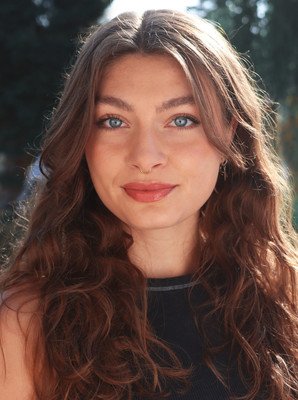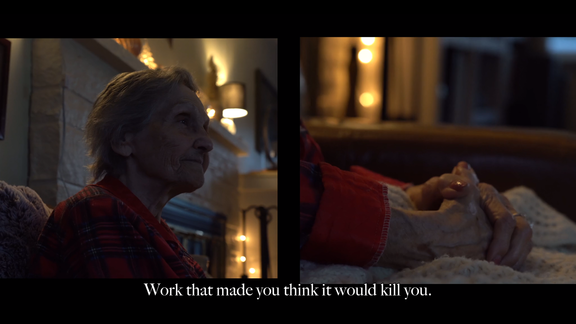The Meantime
Directed by SAMANTHA PESS
United States of America, 2021
Documentary
Kleopatra’s dementia has bittersweetly allowed her to finally accept the caregiving that was taken away in her childhood.
Read our interview with Samantha below to learn more about the film.
SAMANTHA PESS
Est. Reading Time: 6 Minutes
MARK (M) Tell us a little about yourself - when did you become interested in film and filmmaking?
SAMANTHA (S) Along with drawing and writing, I’ve loved making films and taking photos since I was a kid. I think I process the world (and cope with it) through photos and film. It’s a universally accessible medium in that it’s visual and because of that, allows for powerful storytelling.
M Early in the film, Kleopatra mentions that she likes going through old photographs because it helps her remember moments and people. It’s very touching so I would like to ask, what inspired you to make this film about your grandmother Kleopatra?
S Kleopatra was my yiayia. She passed away in July 2021, comfortably and surrounded by people who loved her, with both granddaughters holding her hands. She was like my third parent growing up so when she got vascular dementia in her eighties and we had to become her caregivers, it was a huge change for my community. She was a badass matriarch who inspired and loved everyone in her vicinity. This was a film I felt I needed to make because she was the gravity of my world. It’s an important little film to my community of course but I hope it has weight in a more general context as well because it touches on really important topics like immigrant families, dementia, inter-generational narratives/trauma, and collectivism.
M Kleopatra has a lovely personality, she’s very bubbly, charismatic and comfortable in front of the camera - I think you did a fantastic job in finding angles/shots that weren’t intrusive. When you were with Kleopatra, what made you decide to film particular conversations and moments - was it always natural and instinctive, or did you approach certain days/nights with a rough plan of questions and topics?
S She was very charismatic and funny, I’m really glad that came through! And thank you for those kind words. It was of the utmost importance for me to prioritize her cognitive abilities and comfort in the making of this film, because as someone with dementia, informed consent was a complicated subject. I was constantly reminding her of everything and monitoring her awareness, and adjusting accordingly. With her condition, she would be more alert some days than others, so it was definitely an intuitive and organic project logistically - not even one day at a time, more like one minute at a time. I did some preparation work, like coming up with topics/questions I was curious about, or knowing I would ask her about specific stories. But the most planning I did was visual. I brainstormed what visual vignettes I wanted to include - for example, the pillbox, or the incense. As happens with docs, the story really came out in post, as I was organizing footage and trying to find a threadline to pull from hours of very cloudy non-linear conversations (as they go when someone has dementia).
M I loved how you focused on Kleopatra’s hands throughout the film, I think it’s really sweet when you see her nails with polish. Where did the inspiration to use and connect different shots of her hands come from?
S Super interesting question, because while shooting I’m not sure if I purposefully did that - her hands were something she always took pride in. She had such perfect nails and hands, she just genetically won the lottery in that way. She always kept her nails painted and done. As someone who grew up completely impoverished, and who had to work laborious jobs starting as a child, I think that keeping her hands looking nice was important to her as a way to retain agency over them. When she lost that ability to dementia, doing her nails for her became our routine.
‘Kleopatra was my yiayia. She was a badass matriarch who inspired and loved everyone in her vicinity. This was a film I felt I needed to make because she was the gravity of my world’
— Samantha Pess
On Process & Discovery
M In making and finishing the film, what did you discover and learn that you might adopt or further explore in future projects?
S Since I made the entire film alone in COVID restricted quarantine, I learned how important it is to have a community. Making a film alone was really difficult as I was constantly second guessing my work, doubting it’s quality and relevance. It’s important to have fellow creatives to show your work as you go, get more eyes on it and reassure you that it deserves to be made.
On Inspiration
M What are some of the films and who are some of the filmmakers that inspire you, and why?
S I really admire Sonita (2015) and Kandahar (2001). I was shown both films by Dr. Katarzyna Marciniak in her classes at Occidental. Sonita is a documentary about a brilliant artist and rapper, an Afghan girl named Sonita Alizadeh, who is now a prominent activist. And Kandahar is an interesting mix of fiction and documentary - the film is scripted, but it is loosely based on the true experience of an Afghan woman named Nelofer Pazira. Instead of using actors, most people in the film have similar lives to their characters, creating a piece that tells an important story intentionally and subversively.
Sonita (2015) by Rokhsareh Ghaemmaghami
Kandahar (2001) by Mohsen Makhmalbaf
On The Future
M I know your goals might change and grow over time, but what are your current goals in filmmaking?
S My photography is what I've focused on the most in the past, and it's definitely my main gig. To be honest, I'm working as a waiter right now, and I've kind of lost touch with my film and photography stuff the past few weeks. In the future, I'm open to pursuing photography as well as documentary/fiction in any capacity!
Mark’s Final Thoughts
Really enjoyed reading Samantha shed more light on her grandmother, I’m happy that she was able to honour her legacy and memory in this film. Generally speaking, I think it’s a great idea for young filmmakers to make portraits of family members and close friends because the process and outcome introduces key principles and values of cinema.
Interesting that Samantha didn’t necessarily plan to focus on her grandmother’s nails during production or post-production. I guess it was subconscious as Samantha instinctively knew that her grandmother took pride in maintaining her nails. Regardless, I think it’s still effective and moving on screen, and it’s really nice to hear that her grandmother enjoyed looking after her nails because it’s a small but meaningful reflection of self-care.
And I love Iranian cinema so I’m glad to see Samantha mention a few films - Kandahar is incredibly moving and I haven’t seen Sonita, so I look forward to catching up with it at some point in the future.
The founder of Hommage, Mark Shaba published this interview on 25.01.2022. Mark is a grassroots filmmaker from Victoria, Australia. He respectfully acknowledges the past and present traditional owners of the land on which he creates, promotes and screens art, the Wurundjeri people of the Kulin nation who are the custodians.



























